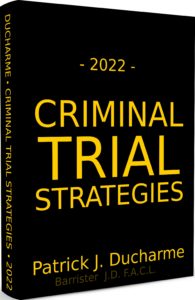Whenever a lawyer questions her own witness, we refer to these questions as “examination in chief.” In examination in chief the lawyer posing the questions is not entitled to ask questions that are leading except in limited circumstances. The questioner may lead a witness in matters that are introductory in nature or concerning matters that are not contentious.
If there is any doubt as to whether a question touches an area that is contentious, it is wise to check with opposing counsel in advance to specifically determine that opposing counsel does not view the subject matter as contentious. Counsel should not assume a matter is not contentious. It is a simple matter to inquire of opposing counsel whether any intended evidence is, in fact, contentious.
Generally the evidence in chief will provide information that supports the side that calls the witness, weakens the opponent’s case, strengthens other evidence that will be called in-chief or weakens the value or credit of the opponent’s evidence.
The above is the an excerpt of Patrick J Ducharme’s book, Criminal Trial Strategies, available at Amazon or in bulk through MedicaLegal Publishing.
Read or listen to the Preface and Introduction and subscribe to Patrick Ducharme’s Youtube Channel.

